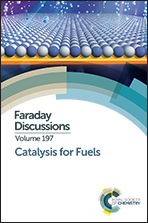PdZn catalysts for CO2 hydrogenation to methanol using chemical vapour impregnation (CVI)†
Abstract
The formation of PdZn bimetallic alloys on ZnO, TiO2 and Al2O3 supports was investigated, together with the effect of alloy formation on the CO2 hydrogenation reaction. The chemical vapour impregnation (CVI) method produced PdZn nanoparticles with diameters of 3–6 nm. X-ray photoelectron spectroscopy and X-ray diffraction revealed the changes in the structure of the PdZn alloy that help stabilise formate intermediates during methanol synthesis. PdZn supported on TiO2 exhibits high methanol productivity of 1730 mmol kgcat−1 h−1 that is associated with the high dispersion of the supported PdZn alloy.
- This article is part of the themed collection: Catalysis for Fuels


 Please wait while we load your content...
Please wait while we load your content...